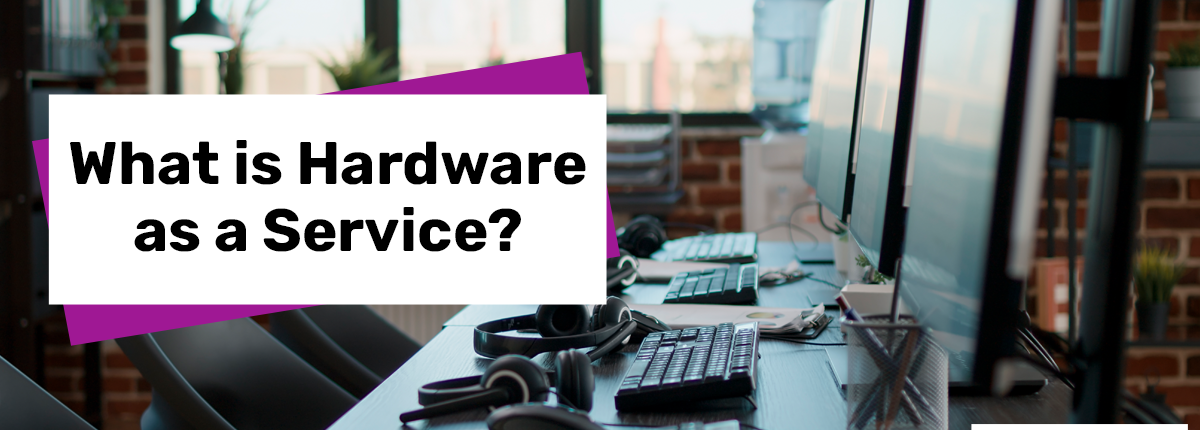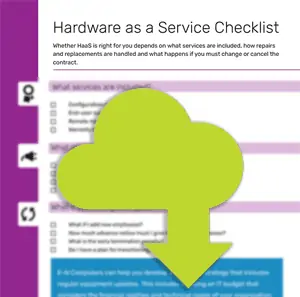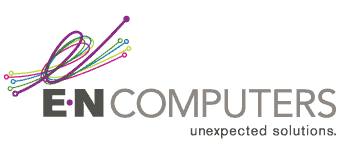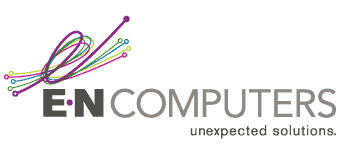
 by Scott Jack
by Scott Jack
Content Contributor, E-N Computers
7+ years experience in healthcare IT and tech support.
As a small business owner or manager, you may know that your IT equipment is getting old, slow and unreliable. But the high upfront cost of new equipment and the headache of tracking depreciation might also be making you put off a needed upgrade yet one more year. Is hardware as a service a good solution for you?
Hardware as a service (HaaS), sometimes called device as a service (DaaS), is a way to pay for new equipment without owning or leasing. It can get you much needed new equipment without the big hit of a capital expense, which makes it a great option for smaller businesses. But it has disadvantages as well.
At E-N Computers, we’ve advised hundreds of small businesses in Virginia and elsewhere on how to keep equipment up to date and secure without breaking the bank. Here’s what we know about the pros and cons of HaaS, particularly for small businesses.
To understand HaaS, let’s compare it with two IT options you might already be familiar with – equipment leasing and software as a service (SaaS). You can think of HaaS as a blend of the two.
QUICK ANSWER:
What is hardware as a service and what are the pros and cons?
Hardware as a service is like renting equipment instead of buying or leasing it. It reduces your upfront costs and is one way of replacing equipment more regularly.
HaaS Compared to Other Options
 HaaS compared to leasing and SaaS
HaaS compared to leasing and SaaS
Previously, we have written about IT equipment leasing options. Equipment leases fall into two categories:
1) a capital lease with a one-dollar buyout at the end, or
2) an operating lease where you return the equipment and lease or buy new equipment. The funding for these leases comes from vendors or leasing companies.
Software as a service, on the other hand, is a subscription model for paying for online software. You gain access to the software for a monthly or yearly fee. The fee includes all updates to the software and maintenance of the systems it runs on. When you stop paying for the software, you no longer have access.
With hardware as a service, you pay monthly for equipment and the services to support it. The monthly cost correlates to the length of the contract, so that a shorter contract will have a higher monthly cost than a longer contract for the same equipment. There are pros and cons to this kind of arrangement. Whether it is right for you will depend on your goals and contract details.
Is HaaS the same as IasS?
No. IaaS or Infrastructure as a Service is a cloud service that replaces physical servers, storage and networking equipment with virtual ones. HaaS covers physical equipment used onsite. Both services can be used together.
Let’s dig into the benefits and drawbacks of HaaS.
Hardware as a Service Contract Checklist

Hardware as a Service can get you better hardware at a lower up-front cost. But, you’ll need to read the fine print on your contract to avoid expensive surprises.
Don’t have time to fill out the checklist right now? Enter your email address (totally optional!) and we’ll send you a link so you can download it later or share it with your team.
Benefits of Hardware as a Service
 At times, small and medium businesses put off purchasing new hardware. The high upfront cost of replacing hardware on a regular basis, plus the need to track and depreciate assets, can be real pain points. These are some of the issues HaaS aims to solve.
At times, small and medium businesses put off purchasing new hardware. The high upfront cost of replacing hardware on a regular basis, plus the need to track and depreciate assets, can be real pain points. These are some of the issues HaaS aims to solve.
Lower Upfront Cost
Hardware as a service converts a major capital expense into an operating expense. Instead of spending tens of thousands of dollars on new equipment in a lump sum, you can get all new equipment at once and pay for it over time. Contracts are for several years, and your payments are made monthly or annually. You may be able to get lower payments by choosing a longer contract.
Built-in Refresh Schedule
With HaaS contracts, regular upgrades are built in. Each time you renew the contract, you get new hardware. For businesses that struggle to purchase newer equipment on a schedule, this is a huge benefit. Replacing hardware on a regular schedule is essential to maintaining the performance and security of your network. Old hardware becomes slower as components age, is more prone to failure, and eventually can no longer receive operating system and security updates. Old hardware is a liability for your business.
These contracts are commonly standardized at three years for end-user equipment like desktops and laptops and five years for network equipment like switches and wireless access points. Keep in mind, though, having a buyout option at the end of a HaaS contract is rare. If you do not renew, you are expected to return the equipment.
Eliminate Tax Implications
When you own or lease equipment, you must account for asset depreciation. Even with a true, or operating, lease you will be responsible for a property tax bill. However, with HaaS, you are not responsible for depreciating hardware, and your hardware costs are wrapped into one tidy monthly or yearly payment.
Drawbacks of Hardware as a Service
Higher Overall Cost
 When compared to the cost of purchasing equipment outright, a HaaS contract will be more expensive. There are several reasons for this. One is that HaaS contracts have finance charges built in. However, there are also benefits like enhanced warranties, monitoring, and management of the hardware.
When compared to the cost of purchasing equipment outright, a HaaS contract will be more expensive. There are several reasons for this. One is that HaaS contracts have finance charges built in. However, there are also benefits like enhanced warranties, monitoring, and management of the hardware.
Important Considerations, or Read the Fine Print
 Whether HaaS is right for you will come down to your business needs and the finer details of the contract. These include what services are included, how repairs and replacements are handled, and how modifying, renewing, or terminating the contract is handled.
Whether HaaS is right for you will come down to your business needs and the finer details of the contract. These include what services are included, how repairs and replacements are handled, and how modifying, renewing, or terminating the contract is handled.
Services
Make sure you understand what services are included in the contract. HaaS solutions include some combination of configuration and deployment of devices, end-user support, remote monitoring and management, and warranty support.
Repairs and Replacements
Find out the process for repairs and replacements. Does the vendor send a technician to do the repair on-site? Or do you have to send the device to a repair depot? What is the turnaround time for a repair or replacement? Make sure the process will fit your needs for uptime; you don’t want a user to be without a machine to work on because his is out for repair.
Change in Circumstances
During your contract, your circumstances may change. Perhaps you’ve grown and need more equipment. Or you find another IT vendor you would prefer to work with. What happens then?
Let’s say you have brought on several new employees. As a result, you need equipment for them to use and even an additional network switch. Will this result in staggered end dates? It really depends on where you are in your contract term. If it happens early on, your vendor may offer a concurrent end date; if you are further along in the original contract term, the new equipment will have to have its own end date to avoid impractically high payments.
Your contract end dates are also important because they impact your hardware refresh schedule. The vendor will need lead time to order, configure, and install your new equipment. Your end date is also important because you’ll likely be required to give advance notice if you intend not to renew.
You may decide that HaaS is not for you or that you need to work with a different vendor. In most cases, you will have to return all the equipment you have under contract. Additionally, you will be on the hook for either a hefty early termination penalty or the remainder of the contract balance. For those reasons, it’s often preferable to wait until the end of the contract to make changes.
If you don’t want to renew your HaaS contract, you will need to plan your transition to minimize downtime. You will need time to order, receive, configure, test, and install replacements for all the equipment that must be returned. And you must meet your contractual obligation to notify your HaaS vendor in advance. A managed IT services provider can help you accomplish this.
The bottom line
All in all, hardware as a service presents an enticing way of lowering your upfront hardware costs and upgrading your equipment more regularly. But it can present challenges if you decide to move to a different vendor or that the rental model is not for you. Make sure to examine the contract before signing. If you want help exploring other equipment financing options and getting on a regular upgrade cycle, talking to a managed IT service provider like E-N Computers is a great place to start.
E-N Computers helps each of our clients develop a holistic IT strategy that includes regular equipment refreshes. This includes creating an IT budget that considers the financial realities and technical needs of your organization. We monitor and maintain your equipment so it continues to perform optimally throughout its lifespan. Our managed IT services are designed to support just your IT department or your entire staff, whichever you prefer.
Implementing an IT strategy that aligns with your business opens the way for more success. We call this alignment “digital transformation” because it transforms your business from one that is disjointed and that treats technology as an add-on to one that deeply integrates technology into company processes to improve the customer experience and your bottom line. How well aligned is your IT to your business right now? Take our short IT Self-Assessment and then schedule a free strategy session to discuss your results.
Take the IT Maturity Assessment

Is your business ready to weather changes, including employee turnover? Find out by taking our IT maturity assessment.
You’ll get personalized action items that you can use to make improvements right away. Plus, you’ll have the opportunity to book a FREE IT strategy session to get even more insights into your IT needs.

Industries
Locations
Waynesboro, VA
Corporate HQ
215 Fifth St.
Waynesboro, VA 22980
Sales: 540-217-6261
Service: 540-885-3129
Accounting: 540-217-6260
Fax: 703-935-2665
Washington D.C.
1126 11th ST. NW
Suite 603
Washington, DC 20001-4366
Sales: 202-888-2770
Service: 866-692-9082
VA DCJS # 11-6604
Locations
Harrisonburg, VA
45 Newman Ave.
Harrisonburg, VA 22801
Sales: 540-569-3465
Service: 866-692-9082
Richmond, VA
3026A W. Cary St.
Richmond, VA 23221
Sales: 804-729-8835
Service: 866-692-9082
